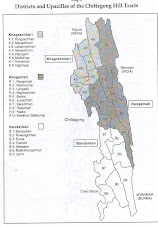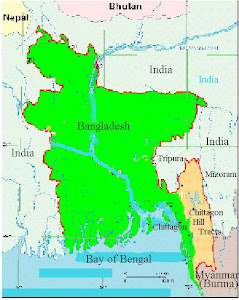Committed to PEOPLE'S RIGHT TO KNOW
The Daily Star, Dhaka, Tuesday, May 6, 2008
Front Page
Baghaichhari arson pre-planned
Citizens' group says
Staff Correspondent
The April 20 arson attack on villages of indigenous communities in Baghaichhari of Rangamati was well orchestrated and pre-planned, and the government has yet to take any action against the perpetrators, an independent citizens' group said.
They also said the victims are still living under the open sky.
The citizens' group comprising different professionals including human rights workers, university teachers, lawyers, and journalists raised questions yesterday at a news conference following a visit to the spot, wondering who could have dared to set fire to the houses next to an army camp.
"We think the reason behind the arson attack was not only the conflict between the indigenous communities and Bangalee settlers, the main motive was to drive away the indigenous people from the area to make way for new Bangalee settlements," said Robayet Ferdous, a teacher of mass communications and journalism at Dhaka University, while reading out a written statement at the conference.
At the conference, the citizens' group said in Sajek they visited eight villages, Nursery Para, Dane Bhaibachhara, Bame Bhaibachhara, Purbopara, Balughatpara, Retkaba, MSF Para, and Gangarammukh, where most of the houses that were gutted belonged to indigenous people while only a few burnt houses belonged to Bangalee settlers, and the government has yet to take an account of the damage.
They said, tension started to mount in Sajek since the Bangalee settlers started building new houses in Chakma villages just a couple of months ago. Quoting local indigenous people, the written statement said the attackers, who were speaking Bangla, first looted all furniture and other valuables in the houses and then set fire to them.
Some Bangalee settlers in Gangarammukh village even did not flinch to destroy a Buddhist temple, Bonobihar Kuthir, to build new houses for themselves, the news conference alleged.
Some Bangalee settlers there have been threatening local indigenous residents with arson attacks on their houses, if they do not go on an exodus into the forest, the citizens' group said quoting local indigenous residents.
They also said the Bangalee settlers there are very poor and depend on government provided rations.
"In Bhaibachhara village we saw a house in between two Chakma houses. The house of Bangalee settler Anawar Hossain was not burnt while the Chakma houses were gutted," said Robayet Ferdous.
In most of the villages all houses of the indigenous people were gutted while the houses of settlers were not, with only a few exceptions, the visitors noted.
"But the Bangalee victims said local indigenous people did not set fire to their houses," Robayet said reading out the written speech.
At the news conference the citizens' group demanded formation of a divisional probe committee and publication of the report. They also demanded stopping settling of Bangalees in Sajek area, and activating the Chittagong Hill Tracts Land Commission to resolve land disputes in the area.
They also demanded release of three indigenous youths who have been detained in the army camp since the attack.
Human rights activist Barrister Sarah Hossain, Gono Forum leader Pankaj Bhattachariaya, and journalist Shameema Binte Rahman were also among the visitors, who were present at the news conference too.
=====================
New Age, Dhaka, May 6, 2008
Rangamati arson targeted ethnic minorities: civic group report
Staff Correspondent
Wrapping up its fact finding mission, a citizens' group has claimed that the poor ethnic minorities were the only target of the recent arson attack in remote Sajek union of Rangamati hill district.
'The mapping of the attack gave an impression that the indigenous people were the only targets. It was a pre-planned attack,' said a report launched Monday in Dhaka by the group after visiting the affected area in the Chittagong Hill Tracts.
It said that the April 20 attack might have been an outcome of longstanding disputes over land in the CHT and encroachment by Bengali settlers.
The 11-member mission headed by columnist Abul Makshud talked to a number of arson victims, especially the indigenous minorities, Bengali settlers and members of the armed forces, who are responsible for maintaining law and order in the hilly region, during its two day field visit to Sajek.
More than 150 homes were burnt to ashes as miscreants set fire mostly to indigenous people's homes in eight villages of Sajek union at night on April 20. Many victims of Narsaripara, Bame Bhaibachhara, Dane Bhaibachhara, Purbopara, Balughatpara, Retkaba, MSF para and Gangarammukh were yet to return to their razed homesteads fearing further attack while others were seen staying in the open, said the report.
Quoting accounts of witnesses from Gangarammukh village, the report said that locals alleged that the attacks were unleashed by Bengali settlers with the help of the security forces.
'In many cases it has been observed that the homes of the poor indigenous people were burned, but adjacent homes owned by Bengali settlers remained untouched,' said the report.
Few Bengali settlers, who were also the victims of the attack, believed that the perpetrators came from outside.
As the team talked to the members of the armed forces, a commander Lt. Col. Imtiaz denied any involvement of the army in the attack. The army officer said his forces being informed visited the spots. He held 'hilly outsiders who do not want to see peaceful co-existence of indigenous people and Bengalis' responsible for the attack.
The fact finding mission, at a press conference on Monday at Dhaka Reporters Unity auditorium, called upon the government for appointing a judicial commission to investigate the attack and bring the perpetrators to justice.
It also asked the government to ensure adequate compensation package for the affected families, their rehabilitation, release of ethnic minority people who were arrested by the army on suspicion and stoppage of rehabilitation of Bengali settlers in the CHT.
The mission emphasised full implementation of the 1997 peace treaty, which ended the decades-long fight for self rule in the hills.
The mission included freedom fighter Tareq Ali, Pankaj Bhattachariya of Sammilita Samajik Andolon, lawyer Sarah Hossain and Dhaka University teacher Robayet Ferdaus.
====================
Independent Bangladesh
CHT arson victims stare into dreary future: report
Saturday, 03 May 2008
Our Correspondent
Seven bordering villages at remote Sajek in Baghaihat of Chittagong Hill Tracts wear a desolate look after the April 20 arson attack that erased 123 houses.
A team of politicians, teachers and social workers from Dhaka visited the area on April 27 and disclosed their findings from a press conference Friday. Unidentified arsonists burnt the houses, leaving a trail of devastation.
Gangaram Mukh village suffered the most. Of the destroyed houses, 79 belonged to Bangalee settlers and 53 to indigenous people. Jahangirnagar University teacher Manosh Chowdhury read out a written statement to reporters at Dhaka Reports Unity (DRU).
Biplobi Oikya Forum leader Moshrefa Mishu and Jatiya Chhatra Front leader Shahadat Hossain and Monjurul Ahsan of Sangskritir Naya Sethu were present.
According to the statement, the affected villagers are passing "inhuman days without shelter". The Bangalee settlers were sheltered under government supervision but the indigenous community is spending their days in Buddhist temples and houses of their relatives.
Many retreated into the deep jungle, the statement said. Rights campaigners demanded formation of a judicial committee to probe the Sajek incident, publication of a report on the latest human-rights situation in the CHT and an end to land grabbing.
skip to main |
skip to sidebar


Map of Bangladesh

CHTs is number one Milliary zone in the world


Ministry of Chittagong Hill Tracts Affairs
The United Nation
The IJPMNA
This page provides information of the minority Indigenous Jumma Peoples in Chittagong Hill Tracts (CHTs) Bangladesh.
Contact with this please write:-ijpnusa@yahoo.com
Contact with this please write:-ijpnusa@yahoo.com
About Us
Location of Jummaland

Jumma Videos
- The BANDARBAN SADAR
- The Rowangchari
- The Ruma
- The Lama
- The Thanchi
- The Alikadom
- The Naikhkhongchari
- The RANGAMATI SADAR
- The Baghaichari
- The Langudu
- The Nanyachar
- The Barkal
- The Jurachari
- The Bilaichari
- The Kaptai
- The Rajsthali
- The Kawkhali
- The KHAGRACHARI SADAR
- The Manikchari
- The Laksmichari
- The Mahalchari
- The Matiranga
- The Ramgarh
- The Dighinala
- The Panchari
Audio & Video
Jumma Natok (Drama)
International Support
Educational Institution
Religious Organization
Buddhist Studies

Map of Bangladesh
Mission of Bangladesh
About Bangladesh
Bangali Audio Songs
Bengali News

CHTs is number one Milliary zone in the world
Online Audios
Refugee in Homeland

Jumma Picture

Blog Archive
About Me
- The Indigenous Jumma Peoples Movement in North America
- The Chittagong Hill Tracts (CHT) region comprises three districts: Banderban , Khagrachari and Rangamati. The districts comprise seven main valleys formed by the Feni, Karnafuli, Chengi, Myani, Kassalong, Sangu and Matamuhuri rivers aid their tributaries and numerous hills, ravines and cliffs covered with dense vegetation, which are in complete contrast to most other districts of Bangladesh, which consist mainly of alluvial lands. Geographically the CHT can be divided into two broad ecological zones: (a) hill valley, (b) agricultural plains. It is surrounded by the Indian states of Tripura on the north and Mizoram on the east, Myanmar on the south and east and Chittagong district on the west.
